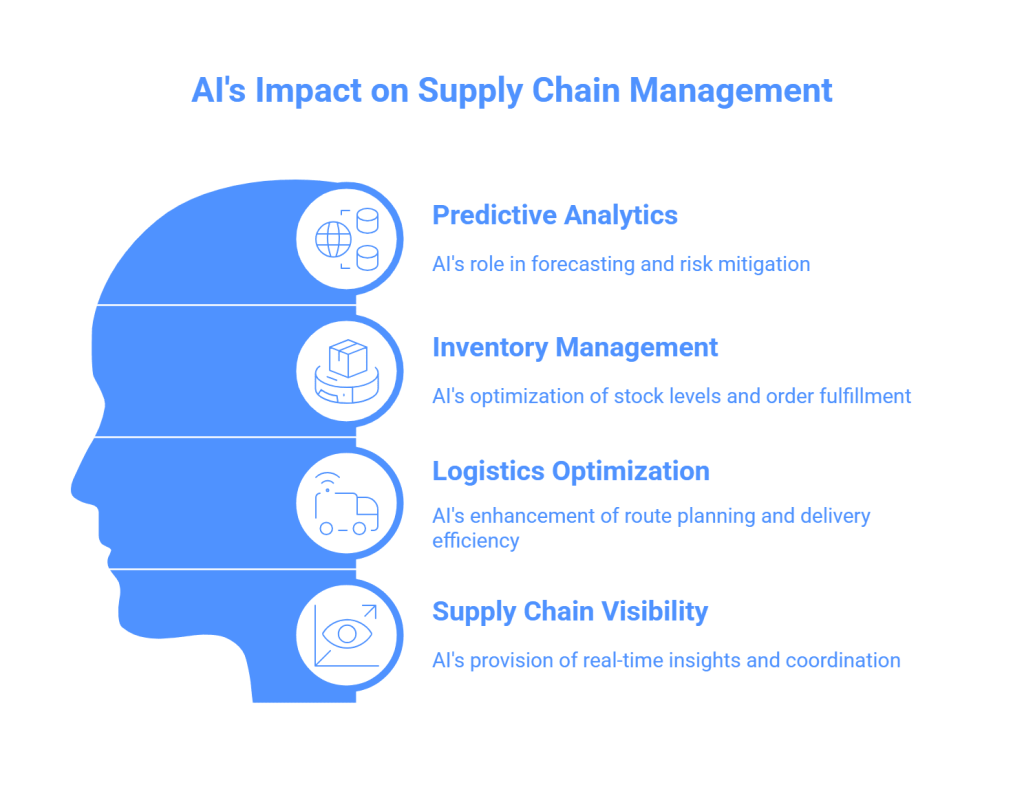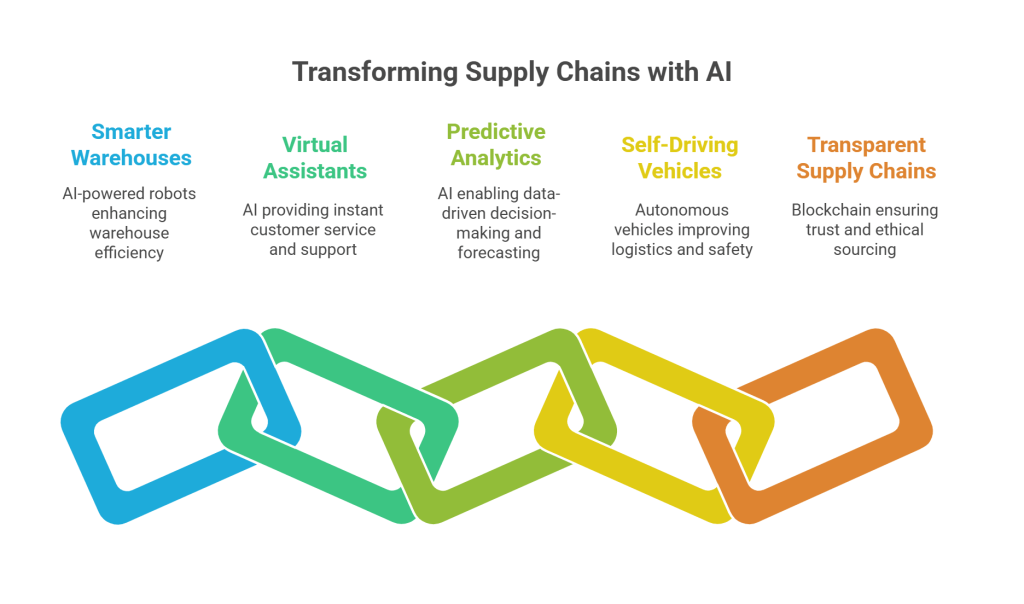
To remain competitive and succeed in today’s global marketplace, companies must run their organisations like a fine-tuned engine to sustain growth.
With that in mind, businesses that use transformative artificial intelligence (AI) technologies are well-positioned to conquer challenges and better manage their supply chains while improving costs and enhancing efficiency, operations, performance, and customer experience.
One of the most critical ways AI revolutionizes supply chain management is through predictive analytics. AI can accurately predict future demand by analyzing data, allowing companies to optimise inventory levels, streamline supply chain processes, and reduce the risk of stockouts or overstocking. This type of supply chain automation is only possible with AI.
The Role of AI in Supply Chain Optimization
AI’s power in analysis can be put to good use in supply chain optimization.
AI’s analytical capabilities are leveraged to monitor inventory levels and predict demand, aiding businesses in maintaining an optimal stock level that aligns with fluctuating demand.
By scrutinizing extensive datasets, AI identifies potential supply chain risks, offering the opportunity for proactive mitigation. The result is a fortified supply chain that withstands disruptions.
Supply chain AI can also be used to improve delivery. AI’s routing optimization curtails transportation costs and improves delivery timelines, enabling businesses to allocate resources effectively. AI empowers businesses to fine-tune production and delivery schedules, streamlining operations and curtailing costs.
Impact Of Artificial Intelligence In Supply Chain Management

The rapid advancements in Artificial Intelligence (AI) have revolutionized various industries, and one such sector benefiting greatly from its capabilities is supply chain management. AI technologies have significantly enhanced efficiency, accuracy, and decision-making capabilities within the supply chain, leading to improved operational performance and customer satisfaction.
1. Enhancing Predictive Analytics
AI has empowered supply chain management with advanced predictive analytics, enabling organizations to make more accurate forecasts. By analyzing vast amounts of data, AI algorithms can identify patterns, trends, and potential disruptions in real time.
This proactive approach allows businesses to optimize inventory levels, mitigate risks, and anticipate customer demands, ultimately reducing costs and minimizing wastage.
2. Optimizing Inventory Management
Intelligent algorithms powered by AI can optimize inventory management by considering various factors such as historical sales data, customer behavior, and market trends. With AI, supply chain managers can accurately determine optimal stock levels, identify slow-moving items, and even predict potential stockouts or overstock situations.
Such insights enable businesses to streamline inventory management, improve order fulfilment, and reduce holding costs.
3. Efficient Logistics and Route Optimization
AI-driven algorithms can optimize logistics operations by analyzing real-time data on transportation routes, traffic conditions, and weather forecasts. By leveraging this information, supply chain managers can make informed decisions regarding route selection, load planning, and vehicle scheduling.
This optimization results in reduced delivery times, improved fuel efficiency, and minimized transportation costs, ultimately enhancing customer satisfaction.
4. Enhanced Supply Chain Visibility
AI-powered technologies offer greater supply chain visibility by providing real-time insights into various stages of the supply chain. With AI-driven analytics, businesses can track inventory levels, monitor supplier performance, and identify potential bottlenecks or delays.
This enhanced visibility enables proactive problem-solving, and effective risk management, and ensures smoother coordination among stakeholders.
The Challenges of Implementing Artificial Intelligence in Supply Chain Management
Along with the number of benefits, there are some challenges associated with implementing AI in supply chain management. Some of the key challenges include:
- Data availability: AI requires large amounts of data to train and operate. Businesses may not have the necessary data available to implement AI tools successfully.
- Technical expertise: Implementing AI requires technical expertise. Businesses may not have the in-house expertise to implement AI successfully.
- Cost: AI can be expensive to implement and operate. Businesses may not be able to afford the costs of AI.
- Change management: Implementing AI requires change management. Businesses need to be prepared to change the way they operate to be successful with AI.
The Human Factor Is Vital When Using Ai
While leveraging AI technology is advantageous, the human factor remains crucial to success. Humans contribute unique qualities to business processes and operations, such as ethical judgment, creativity, emotional intelligence, and accountability.
AI-based machines are faster and more accurate; however, humans bring intuition, emotion, and cultural sense, adding greater significance to the workforce. Uniting AI and human employees leads to more effective decision-making and innovation in various industries.
AI should only enhance human qualities, not replace them.
The Future of Artificial Intelligence in Supply Chain Management

Artificial Intelligence is no longer just a buzzword—it’s quickly becoming the backbone of how modern supply chains function. As technologies like machine learning, predictive analytics, and automation continue to evolve, they’re reshaping how businesses plan, move, and deliver goods.
In the coming years, AI won’t just make supply chains faster—it will make them smarter, more flexible, and far more prepared for unexpected challenges. Here’s what the future might look like:
1. Smarter Warehouses with AI-Powered Robots
Picture this: robots that can pick, pack, and ship products with near-perfect accuracy, 24/7. These AI-powered machines are set to take over repetitive tasks in warehouses, making operations quicker, safer, and more cost-effective.
2. Virtual Assistants That Actually Help
AI won’t just stay in the warehouse. You’ll see more virtual assistants stepping into customer service roles—answering queries instantly, tracking orders, and offering support at any hour. The goal? Happier customers and faster resolutions.
3. Better Planning with Predictive Analytics
One of AI’s strongest suits is its ability to predict. From knowing exactly how much inventory to keep to spotting supply chain disruptions before they happen, AI helps businesses make smarter, data-backed decisions—no guesswork involved.
4. Self-Driving Vehicles on the Roads
Self-driving trucks and delivery vans aren’t sci-fi anymore. They’re on their way to becoming the new normal, helping businesses cut down on fuel costs, reduce delays, and improve safety while moving goods from point A to B.
5. Transparent Supply Chains with Blockchain
AI combined with blockchain will help build trust and transparency across the entire supply chain. With tamper-proof records of every step a product takes, it’s easier to trace issues, prevent fraud, and ensure ethical sourcing.
Conclusion
Artificial Intelligence has revolutionized the field of supply chain management, bringing numerous benefits and opportunities. By leveraging AI technology, businesses can enhance efficiency, optimize inventory management, and improve forecasting accuracy.
However, it is important to note that AI is not meant to replace humans but rather to augment their capabilities. The human touch is still essential in decision-making, problem-solving, and building relationships.
As we look towards the future, AI will continue to play a significant role in transforming supply chains, enabling businesses to operate more effectively and adapt to changing demands.
If you’re interested in staying ahead of the curve and harnessing the power of AI in your supply chain management, join us today! Together, we can navigate the ever-evolving landscape of technology and drive success for your business. Read More – Qodenext
FAQ: Artificial Intelligence In Supply Chain Management
1. How are AI and machine learning applied in supply chain management?
AI and machine learning are used to analyze large amounts of data and improve decision-making across the supply chain. They help forecast demand, optimize inventory, automate warehouse tasks, and enhance overall visibility, enabling businesses to operate with greater accuracy and efficiency.
2. Can AI help predict customer demand effectively?
Yes! AI uses predictive analytics to examine historical data, market trends, and other factors to forecast future customer demand. This helps companies optimize stock levels and reduce the chances of running out of products or holding excessive inventory.
3. What are some real-world examples of AI in supply chain operations?
Popular AI-powered supply chain applications include demand forecasting, warehouse automation, route optimization for deliveries, predictive maintenance of machinery, supplier performance monitoring, and real-time tracking of goods.
4. How does AI improve inventory management?
AI analyzes data like sales history, customer behavior, and seasonal trends to help managers maintain the right inventory levels. It identifies slow-moving items and predicts stock shortages, improving order fulfillment and reducing holding costs.
5. In what ways does AI optimize logistics and delivery?
AI algorithms can plan the most efficient routes by considering traffic, weather, and vehicle load. This reduces delivery times, saves fuel, cuts transportation costs, and enhances overall customer satisfaction.
6. What challenges might businesses face when implementing AI in their supply chains?
Some challenges include the need for large amounts of quality data, the technical expertise required to set up AI systems, high initial costs, and managing organizational changes to adapt operations for AI-driven processes.
7. Will AI replace human roles in supply chain management?
No, AI is designed to enhance human capabilities, not replace them. Humans contribute creativity, ethical judgment, and emotional intelligence — qualities that AI cannot replicate. Together, AI and humans make smarter decisions and drive better results.
8. How can AI help identify and manage supply chain risks?
By analyzing a wide range of data, AI can spot potential risks such as supplier delays, demand fluctuations, or transportation disruptions. Businesses can then take proactive steps to mitigate these risks before they impact operations.
9. What future technologies involving AI are expected to reshape supply chains?
Looking ahead, technologies like AI-powered robots for packing and shipping, virtual assistants for customer support, self-driving delivery vehicles, and blockchain for tracking goods transparency will significantly transform supply chain processes.
10. How does AI enhance supply chain visibility and coordination?
AI provides real-time insights into inventory statuses, supplier performance, and shipment tracking. This transparency helps stakeholders identify bottlenecks early, coordinate better across teams, and respond swiftly to changes or issues.
If you want to learn more about AI-powered supply chain solutions or start optimizing your operations, reach out to Qodenext today! Together, we can help you stay ahead in this rapidly evolving technology landscape.






